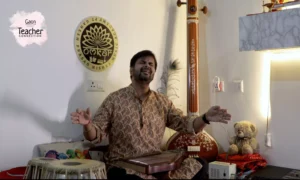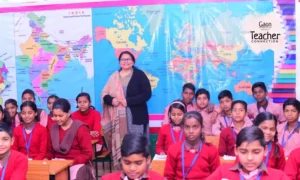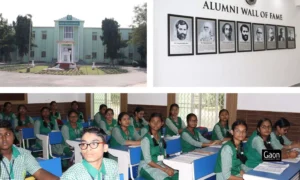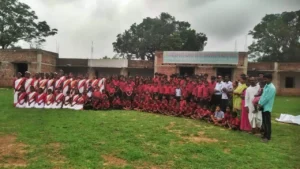Varanasi, Uttar Pradesh
Ananya Sah who is a class three student at the Pichas Mochan Primary School in Varanasi, can’t contain her delight as she looks at all the toys she can play with now.
There are hundreds of children like her who will now be happily engaged in playing with toys thanks to an initiative by the Basic Education Department, Varanasi, along with a non-profit, called Samay Bank.
“I never really had toys to play with. Now we can also play besides studying at school,” Ananya told Gaon Connection.
There were no toys in the school before to play with, said Preeti, her classmate. “The toy library is so wonderful. We don’t have to go anywhere else to play, everything is right here,” Preeti told Gaon Connection.
The toy library initiative was launched to give children from the weaker sections of the society, who had no access to toys and games at home, an opportunity to enjoy them at the government schools they study in.
Prathmik Vidyalaya, Maldahiya was the first school in Varanasi to get a toy library on November 21, 2022. Five days later, another school, Prathmik Vidyalay Pishach Mochan, also had a spanking new toy library.
Also Read: Madhya Pradesh: Innovation and govt’s assurance provide glimmers of hope to Budhni’s toy artisans
Changing face of education
“So far the schools only had libraries for books. But the face of education is changing and it was felt that having a toy library would increase the attendance in the government schools, besides enthusing the children to study better,” Arvind Kumar, the basic Basic Education Officer, Varanasi, told Gaon Connection. When the children first join the school in the primary classes, the toys will motivate them to be more regular to school, he added.
There are about two lakh forty nine thousand (249,000) students studying in the government schools in Varanasi district. In the current academic session, under the School Chalo Abhiyan (begun by the state government in 2000 to provide elementary education to children between the years of 6 — 14 years of age), 83,000 new students have been added to the government schools.
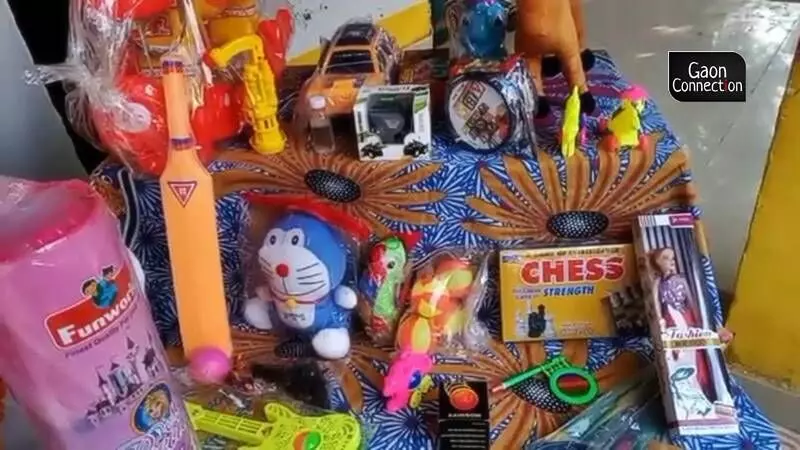
The non-profit Samay Bank that has taken this initiative forward along with the state government’s basic education department was started by Pravirchandra Agarwal.
The basic education officer, Arvind Kumar said that there were plans to open more such toy libraries in other government schools in the district. “We hope this will increase admissions into the school and improve attendance. We will ensure that the toys and games we keep in the libraries are age-appropriate,” he said.
In the Maldahiya and Pishach Mochan government schools more than 250 children come for early childhood education.
Also Read: Online gaming and gambling — a debt-and-death trap for rural youth
“For the first time in our school there are so many games available to us to play with. There are chess boards and pawns, bats and balls, musical instruments, stuffed toys, puzzles, and so much more,” Alok Kumar, a 13-year-old studying in class five at Pishach Mochan school, told Gaon Connection.
Anurag, a class three student, told Gaon Connection how excited he was. “I was quite disinterested in studies and therefore would miss school at least twice or thrice a week. But, now I will be more regular,” the 12-year-old grinned.
Many students bunk classes or drop out of school entirely because of the tediousness of classroom study. “I often would slip out during school hours and roam the streets. Not any more. Now I have all the entertainment right here on the school campus,” Ansh, a class four student, told Gaon Connection.
The idea of a toy library
The non-profit Samay Bank that has taken this initiative forward along with the state government’s basic education department was started by Pravirchandra Agarwal.
“The idea of a toy library is going to bring about a sea change in the government schools in Varanasi,” Agarwal told Gaon Connection.
“I work in a private firm and I live a middle-class life with my family in Varanasi. I could never afford to buy toys for my children. And, I often wondered how children from lower-middle class homes fared,” the 58-year-old told Gaon Connection.
Samay Bank was started by Agarwal in 2017-18 and along with a few volunteers, he would visit the Varanasi government schools in a vehicle filled with toys, let the children play with them during their break, or after school, and then bring the toys back.
“But with the toy libraries, the toys will remain in the school for the children to play with whenever they are free,” Agarwal said. He firmly believes that playing is as important an element in the development of a child as is studying. “Playing can convert ‘waste of time’ into ‘best of time’,” Agarwal smiled.
Also Read: The betelnut handicraft of Rewa
“Children from every strata of society, who come to the government schools to study will have access to toys, which otherwise they may not have had at home. It is an attempt to keep the childhood alive in these children,” Agarwal explained.
Anita Srivastav, the headmistress of the primary school at Pishach Mochan said that most children who study in the school came from economically disadvantaged families.
“Toys are luxury items for these children. Such privileges are denied to them as their parents cannot afford money to buy playthings. The toy library has generated quite a bit of excitement amongst the kids,” Srivastav told Gaon Connection. She hoped this initiative would draw in more children to join the government schools.
Meanwhile, Nitesh Kumar Singh, a clinical psychologist who works at state-owned district hospital in Chandauli district, told Gaon Connection that games and toys are crucial for the psychological development of a child and children belonging to economically weaker section of the society mostly develop inferiority complex when their parents aren’t able to afford.
“Not only the psychological development gets affected, such children develop an innate feeling of insecurity and vulnerability. Later in life, these feelings manifest as anxiety, depression, difficulty in interacting with the society. Some researches have even proven that even the physical development of such children gets affected,” Singh said.
“Playing with toys also adds to the imaginative aspect of a child. It also helps them develop thinking skills and emotional skills,” he added.







